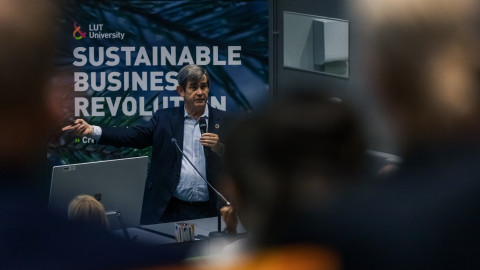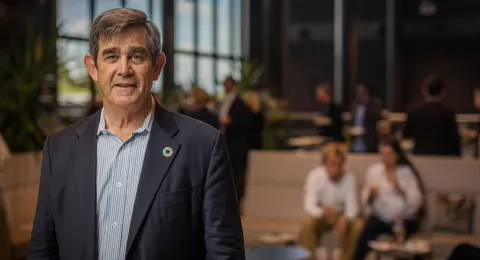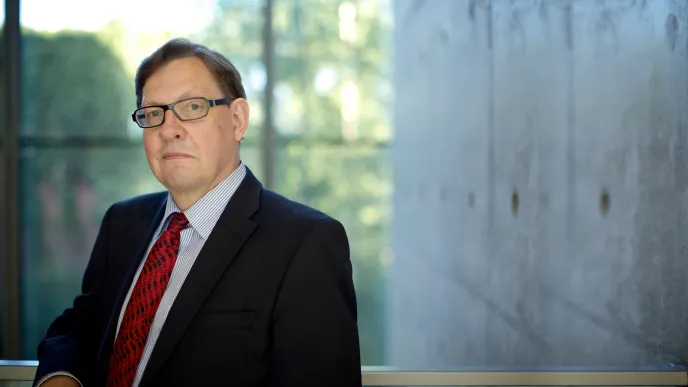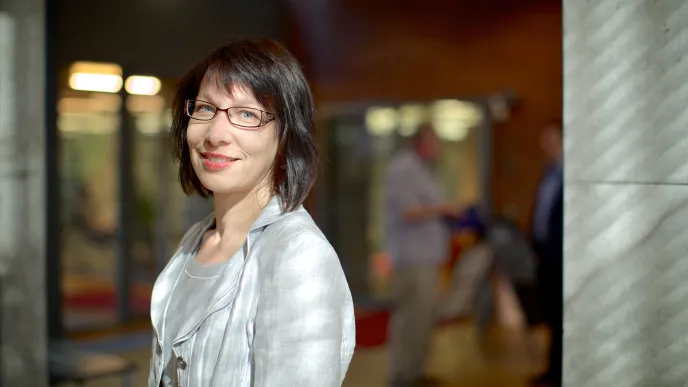How much openness is advisable in the modern world? The question is not new to Professor Henry Chesbrough who is considered the father of open innovation – an academic who gladly stops to exchange ideas and share insights with anyone. He is a man who has dedicated his entire academic career to knocking down barriers in the way of information.
Chesbrough conceived the concept of open innovation in 2003, and the theory become a roaring success.
“Chesbrough has already been cited in scientific publications for nearly 100,000 times. A typical researcher would be lucky to achieve 10,000 citations over the course of their career. The huge number of citations is a sign of the enormous impact Chesbrough’s paradigm has had,” explains Paavo Ritala, Professor of Strategy and Innovation at the LUT School of Business and Management.
Ritala engages in research cooperation with Chesbrough and is thoroughly familiarised with Chesbrough’s concept of open innovation. Ritala argues that along the years, open innovation has become a highly influential paradigm in both practice and research.
“For instance, a Google search for the term ‘open innovation’ returns close to a billion hits, and hundreds of thousands of profiles that mention open innovation are listed in the LinkedIn online service,” Ritala demonstrates.
Open innovation
- specifies various forms of innovation activities that enable the free flow of information among organisations and people; not everything has to be innovated or developed in-house
- can contribute to significant advances as was demonstrated by the development of COVID-19 vaccines
- future challenges include growing geopolitical tensions and uncertainties concerning the data security of citizens.
“Not all smart people work here”
Henry Chesbrough visited the LUT Lappeenranta campus in early June to receive the Viipuri Prize awarded by the LUT School of Business and Management (LBM). The recognition is usually awarded biennially to an internationally acclaimed top researcher whose work has had a significant impact on the research and teaching at LBM.
Chesbrough states he has lost the count of how many trophies he already has, but that he does not want to give the impression that he expects to receive them. Moreover, he assures he does not aim at a certain number of trophies – after all, he is not a top tennis player.
“I have the utmost respect for the people who have been awarded the Viipuri Prize before me. It feels magnificent to be one of the awardees,” Chesbrough rejoices.
Like many other thought leaders, Chesbrough highlights the significance of personal networks.
As he puts it, “not all smart people work here.”
Initially, Chesbrough was supposed to receive the Viipuri Prize much earlier, but the ceremony was postponed due to the pandemic. Chesbrough flew to Lappeenranta from Rome where he visited his colleagues at the Luiss University.
“My colleagues were very happy for me about this prize. After all, I’m not only a professor at the Haas School of Business at UC Berkeley but also at the Luiss University.”
According to Chesbrough, it is a widely recognised fact in both Italy and Finland that strengthening the EU is the only way to keep up with the international competition.
“The United States has an abundance of excellent business schools, but they typically focus on studying American phenomena only. In the modern world, a global angle to research is necessary, and Europeans are ahead of Americans in this respect. If a European state only considers its own interests, it’s bound to lose a whole lot of opportunities.”

“Academics with real-life experience know how to commercialise innovations”
“An open person who provokes ideas in a positive way”, “a good mentor and community leader who is both devoted and easy to approach”, “he shows genuine interest towards the work of others”. These are examples of how people described Henry Chesbrough for the Viipuri Prize ceremony upon Paavo Ritala’s request.
Prior to his academic career, Chesbrough worked in the world of business. During his scientific career, he has acted as a consultant and adviser in corporations.
Chesbrough says that practical business insights have proved a remarkable advantage in both research and corporate cooperation activities. According to Chesbrough, entrepreneurs have commended him for speaking their language.
“Excellent research is conducted in the United States by people who take on academic positions after participating in the establishment of a company and acquiring hands-on business life experience. This is a key factor when discussing how universities could increase their societal impact.”
For example, another UC Berkeley Professor, biochemist Jennifer Doudna was awarded the Nobel Prize in chemistry in 2020 together with Emmanuelle Charpentier for their genome editing method.
“When academics with real-life experience return to the academia, they know how to commercialise innovations,” Chesbrough states.
“Competition between business schools encourages them to try a little harder”
The competition between business schools is getting more intense, and some say that there are too many educational institutions in Finland. Chesbrough argues that merging business schools is not desirable, however, as healthy competition accelerates innovation. According to Chesbrough, every university has a competitor whose activities are monitored and jokingly belittled but actually admired.
“Friendly competition encourages universities to try a little harder.”
Instead of merging, Chesbrough urges business schools to cooperate. There are 10 business schools in Finland, and together they could organise a significant global event that would attract a large international crowd to Finland from all over the world.
“I live in California where 80 per cent of residents were born somewhere else. This creates an interesting mix of people. Everyone brings their networks with them, and people pass on the things they learn. It’s all about seizing opportunities. Likewise, Finns should not focus solely on domestic cooperation, but create platforms that the entire world will follow, like the Eurovision Song Contest.”
Chesbrough considers that LBM’s status as a part of a technical university is one of its key strengths.
“The faculties of a university are too often siloed, that is, far apart from each other. Mutual information exchange between faculties is highly active in LUT, facilitating deeper insight of the world of business.”
As Chesbrough sees it, the small size of the LUT University and the locations of the Lappeenranta and Lahti campuses are clear but not insurmountable disadvantages.
“Distance to large growth centres brings people closer together. This facilitates cooperation and prevents the formation of barriers or makes it easier to knock them down. The same cannot be said about larger clusters.”
“Furthermore, Finland has an ace up its sleeve: the sauna. When the objective is to improve cooperation and break down silos, the sauna may be the best existing technology for increasing openness and information exchange. In the sauna, nobody cares which faculty or position someone represents,” Chesbrough elaborates.
Chesbrough explains that he has been told that all major decisions require that the parties bathe in the sauna together, and his plans included going to a sauna on the day following the interview.
“It is crucial to analyse failures, too”
Politics and legislation also play a role in the commercialisation of innovations. Chesbrough drives a Tesla Model 3 all-electric car which was last year’s best-selling car in Norway. According to the Finnish financial and business magazine Talouselämä, 83 per cent of all cars registered in Norway in early 2022 were all-electric vehicles. In the country, electric cars are exempt from the 25 per cent VAT and the emissions-based car tax. In addition, electric car drivers receive discounts on road tolls.
Chesbrough explains that state-provided tax concessions have a remarkable impact on the increase of green transport, but the electrification of transport is also a question of chicken-and-egg dynamics.
“The more people buy electric vehicles, the more tempting it is to set up new charging stations. The more there are charging stations, the more tempting it is to buy an electric vehicle.”
Chesbrough estimates that it will take a long time before electric cars become mainstream in the rural areas because their increase requires an efficient charging infrastructure – in addition to an affordable purchase price.
He believes that LUT has great prospects in the development of electric transport innovations.
“LUT has already developed the electric motorbike Ukkonen and the waste wood-based fuel bioethanol. So, why wouldn’t you have what it takes to succeed?”
In the United States, corn-based biofuel became so popular that the price of edible corn skyrocketed.
“In other words, the bioethanol project was a failure. But it serves as an example of how business schools can help society. It is crucial to analyse failures, too, instead of anticipated results only. Failures teach lessons in realism and help understand what can go wrong.”
Read more about us:
About the Viipuri Prize
- All awardees in 20 years
- LUT School of Business and Management awards Viipuri Prize to father of open innovation Henry Chesbrough
Some highlights
- LUT School of Business and Management celebrates its 30th anniversary
- LUT School of Business and Management receives AACSB accreditation
- LUT School of Business and Management improves its THE ranking position
LUT School of Business and Management




